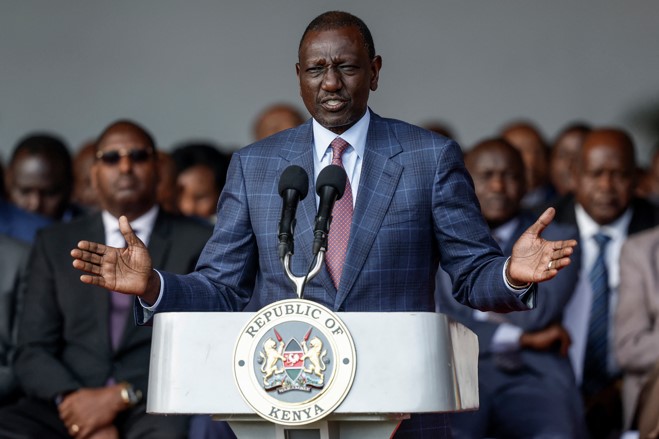On a recent visit from Haitian Prime Minister Garry Conille, Kenyan President William Ruto announced a significant plan to support Haiti in its ongoing battle against gang violence. Ruto declared that Kenya would send an additional 600 police officers to Haiti in November as part of an international anti-gang mission. This announcement comes amid escalating violence in the Caribbean nation, particularly in the capital, Port-au-Prince, where heavily armed gangs have taken control over various neighborhoods. Ruto emphasized the urgency of bolstering security efforts and reiterated the commitment of several nations to contribute troops to the Kenyan-led Multinational Security Support (MSS) initiative aimed at stabilizing the country.
During the discussions, Ruto highlighted that a total of ten countries have pledged to send approximately 2,900 troops to join the Kenyan-led mission. Despite this promising show of international support, he noted that the deployment process has been slower than anticipated. Since the UN-authorized mission commenced in June, only about 430 personnel have been deployed to Haiti, with nearly 400 of those coming from Kenya. This slow pace of deployment underscores the complexities involved in coordinating international military assistance and the urgent need for effective responses to Haiti’s deteriorating security situation.
The Kenyan president framed the mission as a critical opportunity to restore order in Haiti, claiming that “the battle against gangs is one that we can win.” Ruto’s confidence in the mission reflects Kenya’s previous experience in peacekeeping and security operations across Africa. The additional 600 officers, currently undergoing training, are expected to enhance the operational capacity of the police forces on the ground. Prime Minister Conille expressed gratitude for the rapid response of the Kenyan police contingent in the wake of recent violent incidents, illustrating the need for quick intervention and support in life-threatening situations.
The humanitarian toll of the violence in Haiti is staggering, with the United Nations reporting that over 700,000 people have been displaced from their homes due to gang-related conflicts. Furthermore, more than five million Haitians are facing severe food shortages, with nearly half of the population struggling to meet their basic nutritional needs. This dire humanitarian crisis compels the international community to respond decisively in stabilizing the region and addressing the underlying issues that drive the violence and social unrest in Haiti.
In a broader context, the United Nations Security Council recently extended the mandate for the MSS by another year to provide more time for these multinational efforts to take hold. However, a proposal by the United States to transition the operation into a unified UN peacekeeping mission faced opposition from countries like Russia and China, preventing its advancement. This indicates the geopolitical complexities involved in international interventions, as well as divergent views on the most effective mechanisms for achieving stability in Haiti amid its ongoing crises.
The rise of well-armed gangs in Haiti has become a pressing challenge for both the local government and international actors. The attacks, such as a recent massacre attributed to the Gran Grif gang, significantly exacerbate the already precarious security situation and prompt urgent demands for action. The situation calls for collaborative efforts from the international community not only to provide immediate security assistance but also to implement long-term solutions that address both the symptoms and root causes of the ongoing instability in Haiti. As the proposed enhancements to the multinational force prepare to take effect, the hope remains that these actions will lead to a more secure environment and ultimately facilitate a path towards recovery for the suffering population of Haiti.


